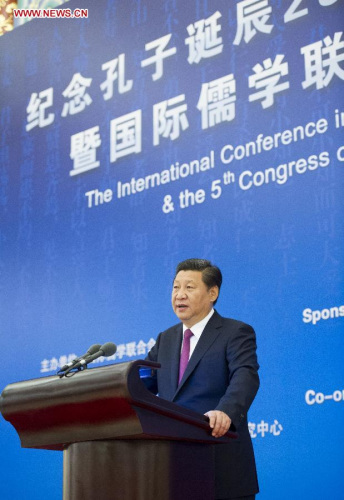

Chinese President Xi Jinping addresses an international seminar to mark the 2,565th anniversary of the birth of Confucius, which is concurrent with the Fifth Congress of the International Confucian Association (ICA), at the Great Hall of the People in Beijing, capital of China, Sept. 24, 2014. (Xinhua/Huang Jingwen)
China on Wednesday held high-profile activities to commemorate the 2,565th anniversary of the birth of ancient Chinese philosopher Confucius.
In a key-note speech at the opening of an international commemoration, President Xi Jinping said Confucianism, founded by Confucius, has profoundly influenced the Chinese civilization and has been an important part of traditional Chinese culture.
The International Conference in Commemorating the 2,565th Anniversary of Confucius' birth and the fifth Congress of the International Confucian Association opened on Wednesday at the Great Hall of the People in downtown Beijing.
"Confucianism, along with other philosophies and cultures taking shape and growing within China, are records of spiritual experiences, rational thinking and cultural achievements of the nation during its striving to build its home," Xi said.
"These cultures have nourished the flourishing Chinese nation," he added.
For thousands of years, Confucius has been regarded as a symbol of China's traditional culture, as well as the country's intellectuals.
He was deified as a great sage in ancient China, and despised as a regressive pedant during the decade-long Cultural Revolution (1966-1976).
After the reform and opening up policy in the late 1970s, respect of traditional Chinese culture has been restored and Confucius Institutes have become a feature of the Chinese culture going global.
Also, Chinese observers believe that Marxism, as the guiding ideology of the Communist Party of China, should be integrated with traditional culture, and only with the integration can it be developed.
"Chinese traditional culture, represented by Confucianism, can provide stable values to enhance social cohesion and sense of identity," said Wang Xuedian, executive vice-president of the Advanced Institute of Confucian Studies of Shandong University.
After taking the helm as Chinese leader, Xi has voiced his respect to Confucius and emphasis on traditional culture as the country's cultural soft power on multiple occasions.
A recent comment was that he expressed his disapproval of removing classical poems and prose from text books, saying that classics should be ingrained in students' minds and become the "genes" of Chinese culture.
Experts also believe that Xi's speech on Confucianism has highlighted the confidence and dignity of the Chinese nation.
While some scholars insist that Confucianism would exert more positive influence on China, especially in state governing, moral improvement and cultural identity, some others argued that Confucianism no longer suits the country perfectly as the feudal hierarchy order it advocated has been replaced by equality, and the feudal rule of propriety has been replaced by rule of law.
However, Zhang Yiwu, a professor and cultural critic with Peking University, believes Confucianism and traditional culture still have their value in modern China, which laws can not achieve.
"China is facing numerous problems and challenges in its transitional period -- relations between humans and nature, relations of man with himself, with others, and with society," he said.
"With the attention from the leaders and enthusiasm of the public, Confucianism and Chinese classics are being revived."
In his speech, Xi said traditional Chinese culture may provide enlightenment for people to understand and improve the world, as well as for governance.
Xi called on people to treat traditions in a scientific way and seek to carry forward traditional culture while developing current ones.
He also urged promotion of exchanges between different civilizations to make the world a better place.
Confucius (551-479 BC), an educator and philosopher, founded the school of thought Confucianism that deeply influenced later generations. He was also the first Chinese person to set up private schools and enroll students from all walks of life.
He is believed to be born on Sept. 28.
China started to conduct annual commemorations of Confucius from BC 478, the year after his death.
This year, commemorations will also be held in Taiwan, Hong Kong and other places in China.
The ceremony in Taiwan will be presided over by Kung Tsui-chang, the 79th-generation descendant of Confucius in the main line of descent.
Xi marks Confucius anniversary
2014-09-25Scholars hail traditional culture in Confucius hometown
2014-09-07Dujiangyan holds traditional ceremony in honor of Confucius
2014-09-04Exhibition shows how emperors honored Confucius
2014-08-18US Ambassador to China visits Confucius‘ hometown in E China
2014-08-14Copyright ©1999-2018
Chinanews.com. All rights reserved.
Reproduction in whole or in part without permission is prohibited.